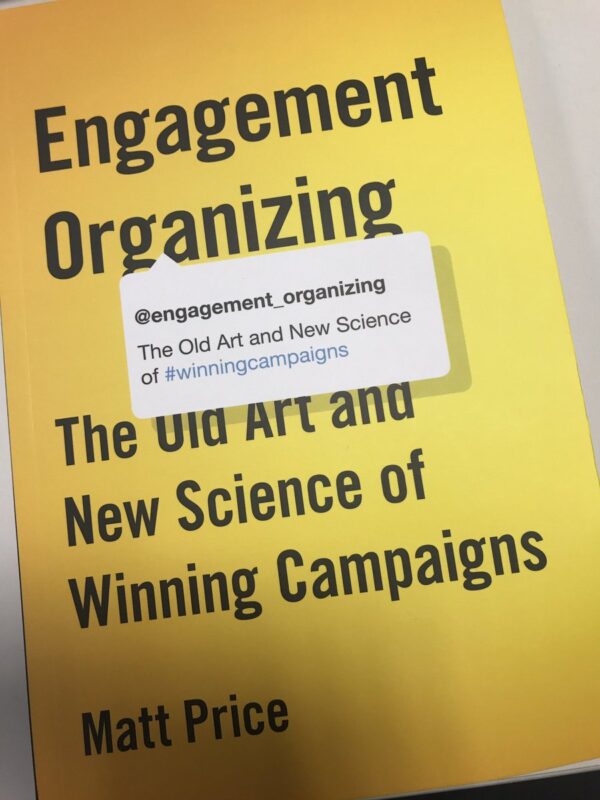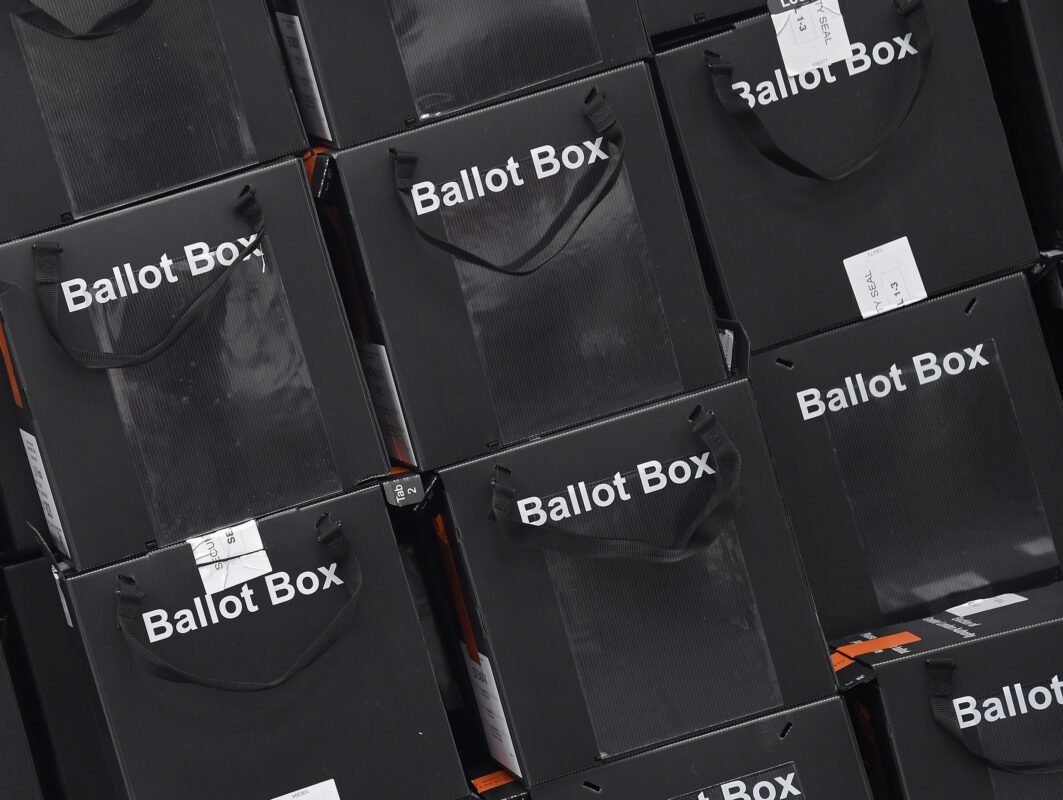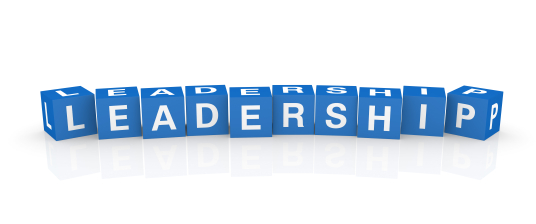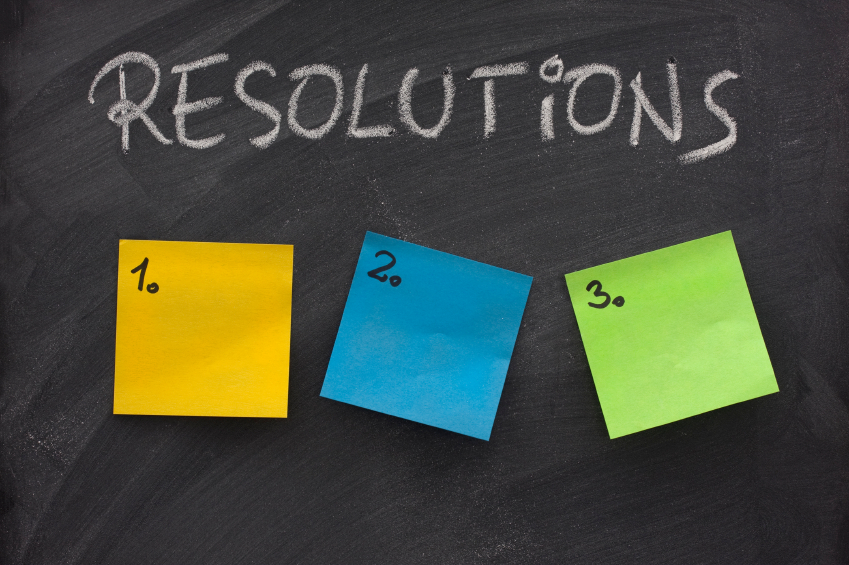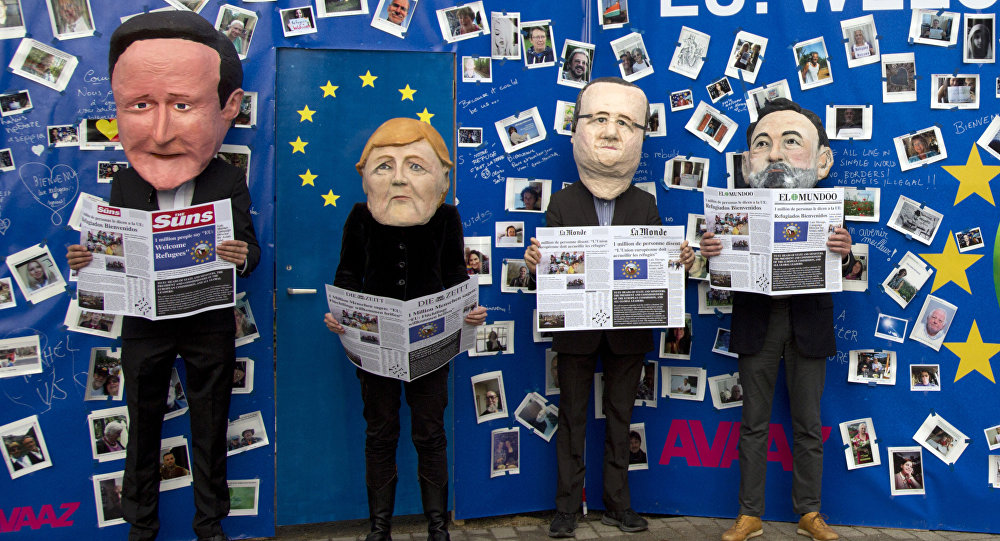A colleague in some recent handover notes wrote ‘while we talk a good game on organizing, we’re still really focused on mobilising’, or something to that effect. It’s a very fair challenge and one that I’ve been reflecting on since reading it.
Like many in the campaigning sector, I’ve got really excited about the opportunities that an organising approach to campaigning brings – not least because I’ve been inspired by the campaigns that are using it and winning, but the day to day model of campaigning that I’m most accustomed to is a mobilising one, and getting from one approach to another isn’t easy.
So I was really excited to get a copy of Matt Price’s new book ‘Engagement Organizing – The Old and New Science of Winning Campaigns‘ at the start of the month. I’d met Matt at the MobLab Campaign Con in Spain last autumn, and read some of his online articles looking at campaigning approaches in Canada.
Matt is based in Vancouver, so the case studies are drawn from NGO, Union and Party Political campaigns that are north of the 49th parallel. We might look across the Atlantic to the US for most of our inspiration, but the reality is that the similarities in political systems in Canada mean we’ve probably got as much to learn for our campaigners, and it was really nice to read some case studies of campaigns and organisations I wasn’t so familiar with.
But what I really like about the book is that it’s a practical how-to guide, that looks to blend together how campaigners can draw on the best of the digital. Instead of trying to push a particular organising perspective, or suggest that everything can be won by smart digital campaigning, the book explores how to blend these approaches together for maximum impact.
Lots in Matt’s book resonates, especially the chapter on the Engagement Cycle, as opposed to the more traditional pyramid of engagement, and also the stories of the approach of Cesar Chavez and the United Farm Workers in using house meetings as an organising approach.
At the end of the book, Price offers some reflections and challenges that prevent NGOs from embracing this approach. They got me thinking back to the challenge from my colleague, and if they’re true in the campaigning that I’m doing;
1. The work is hard – Price writes about the challenge of ‘organizers entropy’ suggesting there isn’t always enough energy in the system to do useful work. That means that organisers need to keep bringing energy into a system, and that often a win can take energy away as those you’ve organised feel that their goal has been achieved. That resonated – moving to an organising approach means keeping moving away from the norm. It’s learning a new memory muscle, and that can be exhausting. As a campaigner, I need to keep bringing energy into the system, and to those pushing this work forward.
2. Resources – while the ‘snowflake model’ shows that you can build an approach at scale with volunteers, and digital tools have lowered the costs for campaigning, Price points out that even then organising at scale costs money. Something that can be especially challenging in organisation where you need to continue to demonstrate impact and value for money. Again this feels very relevant – how do I resource the slow but important work of taking an organising approach, when the mobilising approach can demonstrate ‘quick wins’.
3. We don’t review our ‘stop doing’ lists – rather than a ‘to do’ list, Price suggests we need to ask some hard questions of what we’re already doing, and ask if they’re the most important things we can be doing to ensure we’re effectively using time and resources. It’s a really neat idea, and Price has some helpful questions to ask to help do it;
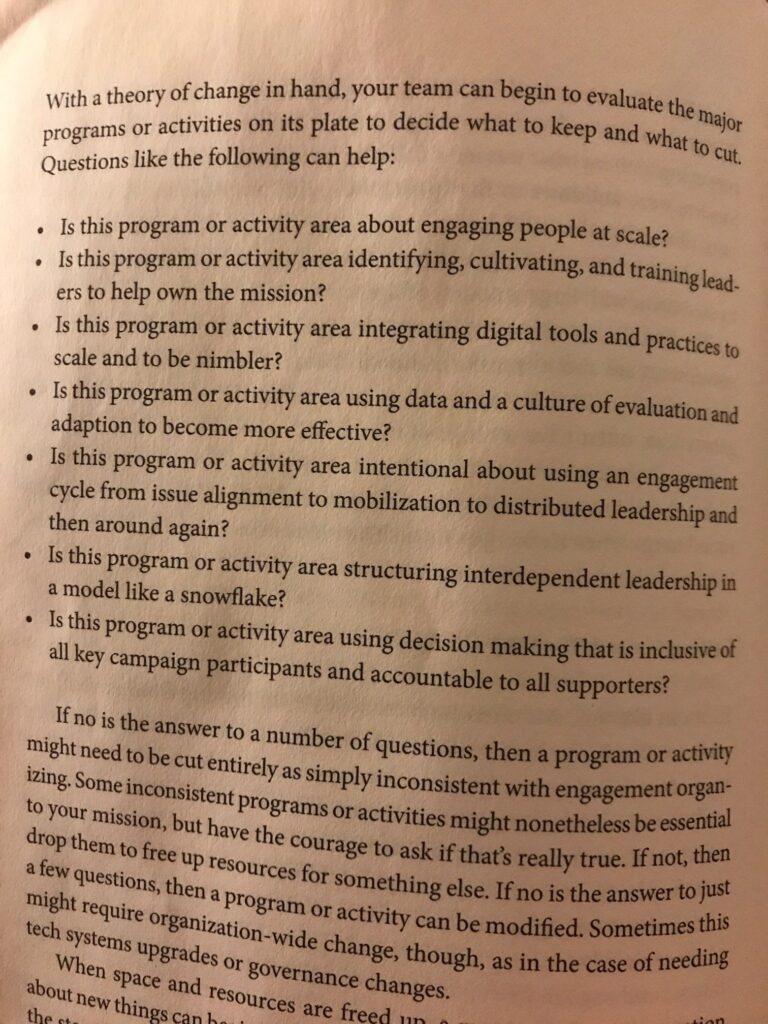
4. Overcoming organisational inertia – Linked to the work is hard, is the challenges we can face within our organisations with systems, practices, and cultures that are hard to change. Some of that comes from the experiences, practices, and expectations of those who’ve risen to more senior roles who’s campaigning was shaped in a more broadcast era (I count myself in this), some of it is about the systems we use which aren’t built, while culture is often seen as the ‘way we’ve always done things’ and is hard to shift. I’m not sure I have any simple solutions to this, but it’s something I’d like to reflect upon in future posts.
5. We need to talk about power – One of my reflections from time spent with Hahrie Han last year is that an organising approach requires us to have more conversations about power – its something that came through again reading the book. Both about how we give it away, alongside control to those we’re seeking to empower, but also how we ensure we’re directing our campaigns to focus on where the power is. As Han says ‘movements build power not by selling people products they already want but instead by transforming what people think is possible’.
I’d recommend Matt’s book for anyone interested in how to embrace a more organising approach in their campaigning.
Category: learning
What campaigners can learn from Chris Froome
I’ve been fascinated by politics and campaigns from a young age, but my parent have evidence that I’ve been making Tour de France scrapbooks to follow the annual cycling race since I was 10!
So as Chris Froome wins his 4th Tour de France, I’ve been thinking a little about what lessons campaigners can draw from cycling, and in particular Team Sky (who’ve won 5 of the last 6 races) when it comes to strategy, approach and execution.
1 – Be totally focused on winning – Team Sky come to the Tour de France with one clear objective each year – to win the race. Throughout the 3 weeks that the race moves around France, there are plenty of other sub-objectives to distract – you can win stages, win other jerseys, and more. But Team Sky don’t get distracted by them – they just care about getting their leader across the line in Paris at the end of the race. It’s a ruthless focus on a single goal.
2 – Adjust your plans daily – The old adage that ‘no plan survives first contact with the enemy’ is true in the Tour. There are so many factors the can’t be immediately planned for or predicted – the weather, someone on the team might be injured and not able to race or a mechanical problem. Anticipating what might happen, and then adjusting has been evident throughout the race, when Froome got a puncture, the team member riding alongside him was ready to sacrifice his wheel, while others were ready to pace him back to the front. And because the team have a clear objective, they know what the implications of adjusting the plans are.
3 – Poor planning leads to poor performance – Let me take you to Rodez and the end of stage 14. Chris Froome has lost the Yellow Jersey (worn by the leader of the race) to Italian Fabio Aru, but his team have spotted that the finishing line is uphill and could allow Froome to get some time back on Aru. So the team ride the whole day with the objective of getting Froome to the foot of the climb at the front of the field. Aru’s team don’t and he loses the jersey.
Other examples abound, from having support staff down the narrow roads of the French countryside to give out bottles and musettes (the bags with the cyclist food) rather than rely on going back to the support cars, to exploiting the changing direction of the wind on stage 16 to break the field into a smaller group, to having mechanics double-check everything on the final Time Trial stage because Froome couldn’t afford a mechanical mistake. Team Sky don’t let anything get past them when it comes to being brilliantly prepared. It’s a good reminder for campaigners to apply the same approach.
4- Marginal Gains – Team Sky are built on the concept of marginal gains – the idea that you should be looking for ‘the 1 percent margin for improvement in everything you do’. It’s about being data driven and question everything + challenge existing assumptions. Earlier this year I read ‘The Talent Lab‘ which looks at the approach of the British Olympic team, which shares many of the same approaches as Team Sky.
When members of British Cycling, who work closely with Team Sky, identified that they could improve the power output of there cyclists by making small adjustments to the saddle angles they lobbied for the rules to be changed. Nothing is left to chance when it comes to the approach they’re taking, but perhaps more importantly no question or assumption is a dumb one to asks. For campaigners I think it’s a reminder to look for improvement in every area, but also have a really questioning mindset.
5 – It’s a team effort – Sure it was Chris Froome standing on the top step of the podium in Paris, but he’ll be the first to tell you that he couldn’t have achieved it without the 8 other members of his team. Everyone in the team has a clear role to play across the range and through each stage. Some to support on the flat, some when the race goes up hill. In some way cycling is the ultimate team sport. It reminds me of this list of roles needed in an advocacy movement. You often need all of those roles to be successful.
'Mistakes, I've made a few'
‘Mistakes, I’ve made a few’ so goes the song. I’ve been thinking a lot about how I can learn from mistakes and failure since the start of the year. Much of it was prompted by reading Matthew Syed’s Black Box Thinking. In it, he writes
‘a closed loop is where failure doesn’t lead to progress because information on errors and weaknesses is misinterpreted or ignored; an open loop does lead to progress because the feedback is rationally acted upon’
The book explores why some industries, like airlines, are good at practising open loop learning, while others, like the medical profession, less so – see here for the obligatory Ted Talk to accompany the book.
I’ve been thinking a lot recently about how I can get better at learning ‘open loop lessons’ in my work. Many of the campaigning organisations that I admire at the moment talk about how they have a culture of testing, and a high tolerance for failure, so what can I do to encourage that where I’m working?
It was something I challenged others at ECF to do (and it’s something I’ve blogged about before), so informed by a Chatham House rules session at ECF back in April, and my own reflections on when I’ve not got things right, here are a few reflections on how projects that I’ve been involved in don’t always work out the way they should.
1. The internal excitement bubble – sure they say in a brainstorm that ‘no idea is a bad idea’ but if you’re going to invest significant resources in taking an idea to market, it can pay to do some insight work first. To check that when you take your idea out of your organisational bubble it still a great idea. I remember the campaign I was involved in when we were sure people would want to stick around and ‘make a weekend’ of the march, so we invested in a range of events. Hardly anyone came along. Something we would have found out if we’d asked a few people about their plans. Great idea in our bubble, less so outside of it!
2. Going to scale too quickly – sometimes good ideas need to take time to grow, you need to start small to learn what’s really going to work and what’s not going to work before you go to scale. I know that I’ve fallen into the trap of believing that we can quickly grow a scheme or idea, but in the attempt lose a huge amount of the goodwill you need for a project to succeed. I can vividly recall one volunteer project when we came up with an elaborate plan involving, but soon found it wasn’t working. A quick pilot of a few months would have easily helped us to iron out the kinks in it, but instead, we squandered a huge amount of goodwill.
3. Less failing, more fizzling out – Perhaps this shouldn’t be talked about in a post on failure, because much of our focus on the failure of a project or idea to get off the ground. But the truth can be that sometimes not knowing when to end something is as much a failure as not getting something started. I can think of a number of projects that we should have closed down rather than just keeping them going with just enough resources to stay afloat but not enough to have the real impact they should.
4. The resource gap – I know I’m guilty of this, especially as a manager where it always feels like you’ve got to make a trade-off between the amount that you can resource a project. But not backing a project with the resource it needs, or worse still ignoring what experienced colleagues are saying about the resourcing needs, in the hope that by sheer determination you can get it over the line.
5. Who wants a project to succeed? – Successful projects need clear owners. I’ve seen many projects squander because they lack someone who feels responsible for delivering. This is especially easy in a big organisation where. Since starting in my new role at Save the Children I’ve really found using a R.A.C.I. to be a useful tool. They help to ensure everyone is clear on who is responsible (the person who is going to make it happen) and accountable (the person who needs to be held to account if doesn’t happen). How I’d wish been introduced to that earlier in my career.
6. A Fresh Pair of Eyes – We’ve all done it, sent an email out with a terrible typo in the subject line, forgotten to add the link in or accidentally over promoted someone in an email. Lots of the mistakes I make are because I’m too close to the topic and thus blinkered to the details. A fresh pair of eyes is what’s needed. But as Jim Coe writes in this post on why we missed the election outcome, the concept could be used more widely, by making sure that we’re involving a wide range of perspectives and approaches, to challenge what might be in front of us but we can’t see because we’re blinded by certainty.
I’m certainly on a journey on all of this, so I’d love any reflections that readers have about how as campaigners we can get better at open loop learning.
Before the results – some observations from the 2017 General Election
I love elections.
While I might have complained when I first heard that Theresa May was taking the country to the polls, it wasn’t long before I found myself getting stuck in campaigning in my local community, and implementing our (hastily assembled) election plans at work.
Who knows what will happen on Thursday evening, but before the results come I wanted to highlight a few ‘winners’ from the election, based on the campaigns that I’ve noticed.
1. The rise of the MicroPACs – BBC News has this great article on the rise of individuals who’ve used Facebook and other social media platforms to get their campaign messages out, what they’re dubbing MicroPACs – after the Political Action Committees that pour huge amounts of money into campaigns in the US. While much of the campaign news has focused on the huge ad spends of the Conservative Party on Facebook advertising, learning from what Trump did in the US which is summarised well here.It’s fascinating to see how individuals with some expertise of how to do effective targeting, and effective messages can get them out in front of tens of thousands of people.
Certainly a lesson to be learnt here for all campaigning organisations about how giving away some control of your message can lead to creative execution of ideas. Having said that the work that the team behind Who Targets Me has been doing is also fascinating work tracking the adverts that the parties are pushing – this article gives a small snapshot in the breadth of messaging targeting.
2. 38 Degrees and Avaaz dive right in – Unlike 2015 when it felt that both of the big online platforms seemed to be less involved, both Avaaz and 38 Degrees have been really active in this election. Perhaps been learning from colleagues at Get Up in Australia who’ve built themselves in formidable election campaigning machine.
While 38 Degrees have been focusing on voter turnout in two marginal seats (Hove and Bath) looking to encourage civic participation rather than pushing a specific party, as well as organising a hustings. Avaaz have been much more active at pushing supporters to join activities of progressive parties, and supporting the work of the Progressive Alliance (see below).
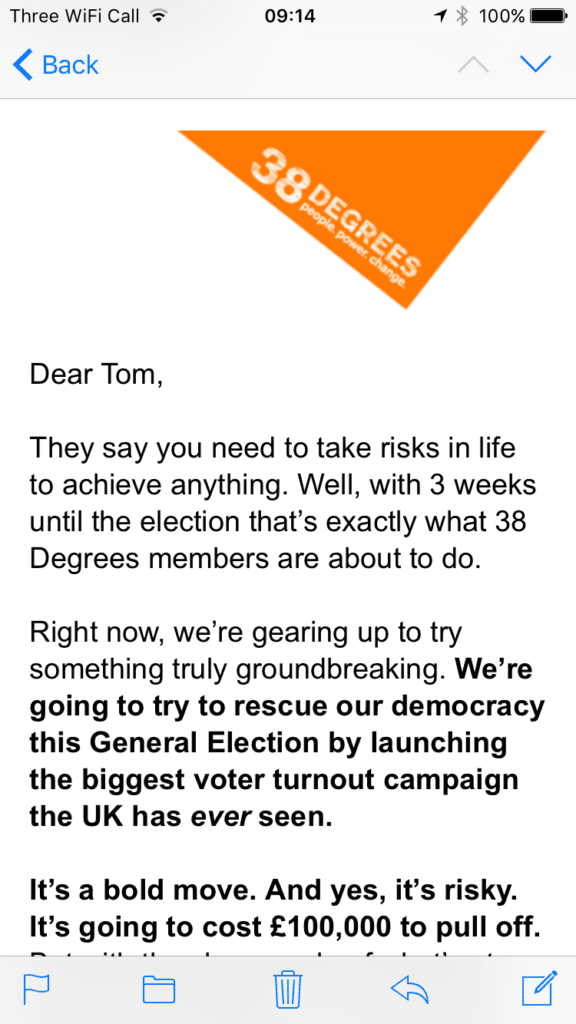
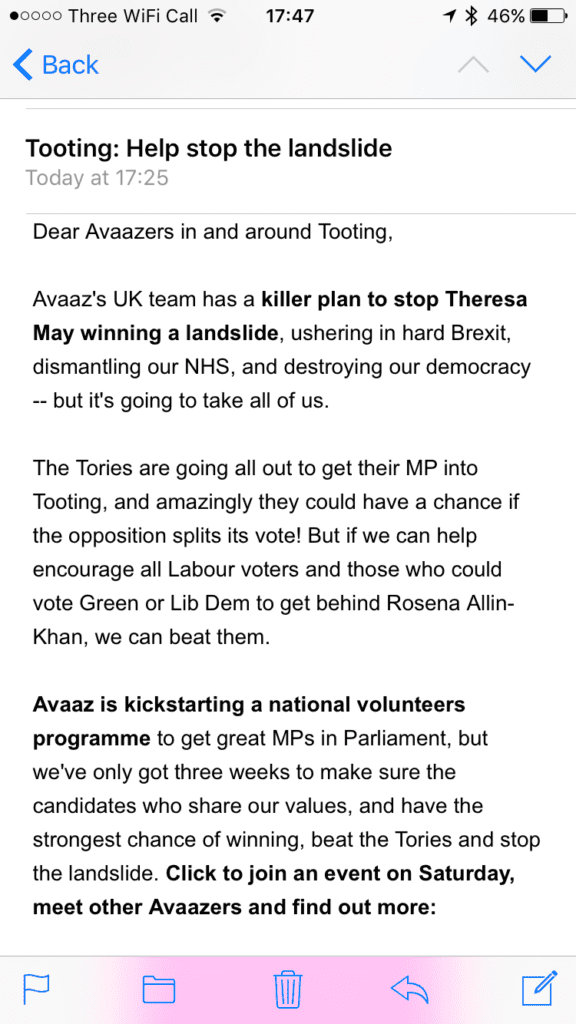
It’s also been interesting to see a few other initiatives emerge during the election, including More United, which was is campaigning for pro-Remain candidates, and Campaign Together, which has been driven by some campaigners involved in the Bernie Sanders campaign. I’m sure post-election there will be time for those involved in some of these initiatives to share the stories of what worked and didn’t work, hopefully providing some useful lessons for campaigners on new models of organising.
3. Go local – I’ve long been impressed by the School Cuts campaign run by the NUT but they seemed to have kicked it up another level this election. The website has been updated to show the impact of proposed party manifestos from each party, coordinate local groups – I’ve seen an increasingly active local campaign in Tooting where I live, and some cracking social content which has clearly tapped into parents concerns. Some really useful lessons in this for all campaigners, including about the importance of providing local information if you can to help make your campaign as tangible as possible to people.
4. The Lobbying Act – despite renewed assurances from NCVO and even the Electoral Commission that charities can campaign, the act seems to have had the anticipated ‘chilling effect’ on many charities (see here as a good example of concerns). Perhaps it was the short notice of the campaign that meant unlike 2015 organisations didn’t have time to prepare, but the act has once again appeared to have an impact on the way that many charities have engaged in the election. Following the election, campaigners need to look again at how we can get the Act amended to remove any ambiguity about charities campaigning during elections.
5. Aid Campaigners – so I’m biased, and can’t share everything that happened, but the first few days of the election saw a huge amount of focus on if the Prime Minister would commit to maintaining the 0.7% aid target. It was a heavy lift, but within a few days we’d seen all parties commit to the target. It happened through a combination of bringing smart insider engagement with key influences together with targeted public pressure demonstrating the depth of support for the issue, and developing messaging we felt would resonate beyond our traditional supporters (see #BiggerBritain). It was lesson for me of the importance of how all the aspects of advocacy can complement each other, and how to use different tactics to drive the issue across news cycles. I’ll write more in due course!
And finally, NCVO has also come up with a neat list of 10 great charity campaigns this election – it’s full of more good ideas of how charities can make the most of an election.
Leadership in campaigns – links for Sheila McKechnie Foundation 'Masterclass'
I was invited to speak today at a Sheila McKechnie Foundation ‘Masterclass’ on leadership in campaigns – mobilising internally and externally. It was a fun session sharing alongside Claire Hazelgrove from Friends of the Earth, and a group of 20 or so campaign leaders from across the campaigning community in the UK.
We looked at what it means to lead internally within our organisation and externally in coalitions. I draw on a few themes that I’ve written about before on this blog, but wanted to pull together some of the resources I mentioned during the session, both for those who came along (thanks for joining) and others who might be interested.
Leading Internally
- When it comes to leading others, it’s really helpful to take the time to consider your leadership style. Tools like Strengthfinder, Myers-Briggs, or www.16personalities.com can be helpful for thinking about this, and then having a conversation as a team or with who manage you.
- I’ve found the writing of Margaret Wheatley, who wrote this excellent and very accessible paper (it’s only 6 pages long) on ‘host leadership’ a few years ago excellent and speaks to some of the differences of leading campaigners.
- These are a few more of my thoughts about leading campaign, and the importance of making sense of the story for those your leading, and the need to continue to share your theory of change.
- I’d encourage any campaign leader to create space to be curious. Some of my thinking has been drawn from the work of Duncan Green and idea of dancing with the system, see my post here on his ideas, and a link to his book ‘How Change Happens‘. I’d also really recommend this by Kate Norgrove who has just finished as Head of Campaigns at Water Aid asking how we know if we’ve made a difference.
- This is more about the DARCI tool that Claire shared.
- When it comes to leading ourselves, I’ve spotted a few people sharing www.findingsteadyground.com in the last few weeks, this is timeless advice and plantothrive.net.au is a good set of resources from Australia.
Leading Externally
- I always point people to this long read from Brendon Cox from a few years ago is an authoritative look at what makes a coalition work.
- A few of my thoughts about what makes coalitions work are here, while this is about the costs of working in coalition. Headlines are they require work, build trust, find the coalition builders and know when to end it.
- I really enjoyed the discussion about how we maintain hope in difficult times. If you’ve not watched Selma, Pride, Milk, Cry Freedom or the many other great films on campaigning then do (this list has some other ideas), and I think it’s prompted me writing another post about the leaders behind the leaders of great campaign movements. As Claire reminded us we should never forget these words of Martin Luther King
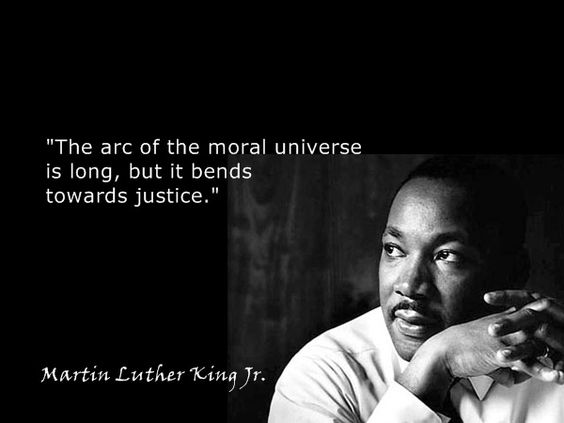
- On how our tactics need to respond to the times we find ourselves in. I’d recommend a read of Micah White’s ‘End of Protest‘ not an easy read but a really interesting one.
Why it's time for campaigners to take digital security seriously…
While my password is more sophisticated than ‘password’ – you might laugh but a recent article by suggested that’s a very common password – I know I’ve not spent enough time thinking about protecting myself online.
But with news of the hacking of the Clinton campaign, an awareness of how much information that I produce is held in ‘the cloud’, and reading stories like this about a sophisticated attempt to create a fake campaign group to hack the IT systems of organisations like Amnesty who had been raising concerns about workers rights in Qatar. I’ve started to think that I need to consider taking my digital more security more seriously.
As campaigners, we’re often working on issues where there are powerful vested interests that we’re opposing, so making sure that we’re thinking about our data security should be on our to do list. Attending CampaignCon in October it was interesting just how many campaigners at the conference were talking about it as a key concern for the work they’re doing.
For many campaigners, it’s a challenge to get the balance right. We want to collaborate with others which makes platforms like Dropbox and Google Doc invaluable, we need to use social media channels like Twitter and Facebook to get our messages out, and investing in complex cyber security can feel like an unnecessary cost when every penny counts..
It’s easy to think that you only have to worry about your digital security if you’re running some campaign on the arms trade, or in a country with a repressive government. But that’s before you start to investigate the powers that governments have over our data (see the recent Investigatory Powers Bill/Snoopers Charter passed in the UK last) or consider what new laws President Trump might implement and what that would mean for any data held in the ‘cloud’ on a US server.
2017 is the year that cyber and data security need to be every campaigners concern.
If that’s not enough to convince you – at a time when elements of the media are looking for charity scandals making sure that you’re no unwittingly writing a front page story is another reason to revisit those social media permissions.
I’m no expert at how to do this, but I’ve found the following articles really helpful as an introduction to thinking about digital security – but please do add other thoughts in the comment box below.
Step 1 – Start with some light housekeeping – I found this article from Owen Barder really helpful. It’s nothing complicated, but making sure that you’ve got two-step authentication set up, are using a password manager and thinking about where you store key information are some simple and easy steps to take.
Step 2 – Think about encryption – This is a really helpful guide to thinking about how you can tread more lightly when you’re using the internet. Again, nothing that requires lots of technical expertise, but it’s got some really useful suggestions about how to search in private or use secure message platforms like Signal to share.
Step 3 – Consider a digital detox – If you’re concerned about Google actually knowing more about you that your best friend thanks to your search history, use of Google Maps, etc. Have a look at the Digital Detox that Tactical Tech have launched. Again its’s full of really simple and easy steps you can take to take back control of your digital self
Step 4 – Review your campaigns risk – Clearly every campaign comes with a different level of risk attached to it, but this articles from Mobilisation Lab really helpful. I found thinking about this made me consider what information I’m sharing information with on email or who is on those big mailing lists I’m sharing my latest campaign dilemmas with.
Step 5 – Dive in to find out more – The Tactical Tech Collective is a brilliant place for anyone wanting to learn more about digital security – there Security in a Box project while designed for frontline human rights defenders has lots of practical ideas.
Please do use the comments box to share others thoughts, ideas and resources.
What more can I be doing in 2017? My campaigns resolutions for this year
Today will mark the first day in the office for many after the Christmas break. In previous years, I’ve written posts on the resolutions that you can make to be a better campaigners this year (you can read them here) they’re full of useful advice that I’d stand by, but this year I’ve decided to share the 7 things that I’m going to try to do more of as a campaigner in 2017.
2017 feels like it’s going to be important. 2016 was a difficult year, and on many of the issues I care about their is real jeopardy about the progress we’ve made or could make, so now the Christmas break I’m asking myself what more can I be doing in 2017.
We’ve got work to do, so by sharing this I’m doing so for 2 reason – for accountability, in the hope that by writing this it’ll be harder to avoid doing it (please ask me if you see me) and to prompt other to think about what more they plan to do over the next 12 months.
1) Listen more – If I’m taking anything from 2016, it’s that I need to listen more. I’ve been sharing this quote from Sir Craig Oliver with everyone, because I think it’s at the essence of what we so often get wrong in campaigning.
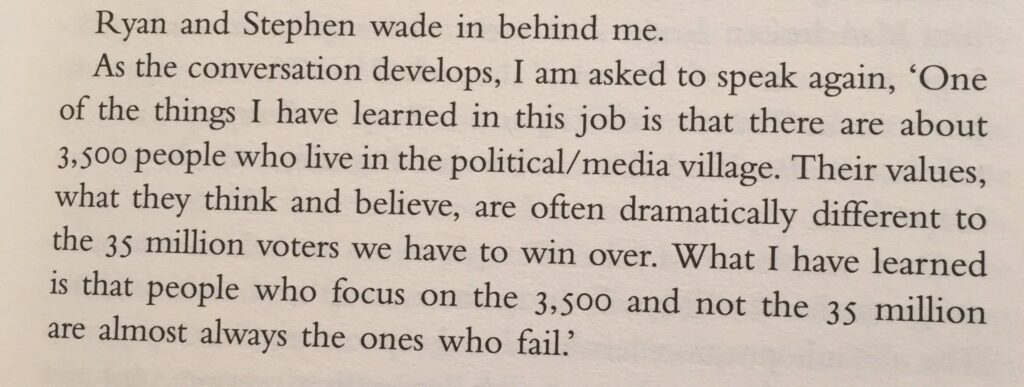
So in 2017, I want to find ways to listen more – to understand what those outside my ‘bubble’ are thinking and to actively seek out different perspectives. There is a temptation to rush from listening to suggesting action or solutions – but I’m not sure that’s going to solve the challenges we face.
So 2017 is a year of listening – I’d welcome practical suggestions of how best to do that. One colleague suggested that we adopt the political party approach of surveying local resident, or perhaps it’s street stalls on High Streets, but whatever solution I come up with I want to be listening more.
2) Share more – I’m convinced that movement generosity is going to be vital if we want to win more. Movement generosity doesn’t mean that we all have to adopt the same approaches or tactics. Far from it, we need to recognise that we’re more effective thanks to campaigns taking insider and outsider approaches, but movement generosity for me is about actively asking how can we collaborate together, and taking time to learn and share from each other.
So in 2017, I want to share more. That’ll be by continuing to write on this blog (and thanks to everyone who has said encouraging things about the blog this year) and make a point of responding to at least one question a week on the E-Campaigning Forum, but I’m also really keen to get out and share with other campaigners – so if you’d like to invite me to speak to your team, department or conference please get in touch. In return, I want to learn from others who are leading and winning campaigns.
3) Read more – I’ve written before that ‘leaders are reader’, so inspired by this article I’m setting myself a goal of reading a few pages everyday, I want to dive into learning more about the Civil Rights Movement something that has long fascinated me, but also learn more about unsung movement builders from history and . I know that reading isn’t for everyone, some people prefer audio books and podcasts (if that’s you here is a list of some podcasts you might want to subscribe to), but however you take in information, I think the principle of actively seeking out new information is a critical one.
4) Get out more – One of the books that I read over Christmas was Gillian Tett’s ‘The Silo Effect‘. I really enjoyed it (and I plan to write more about the lessons we can take from anthropology that she suggests). The book is full that we need to be proactive at getting out of our silos that often emerge in our organisations – perhaps that’s self evident but how often do we fail to do it, accepting that they just exist! This quote at the end of the book is a good challenge;
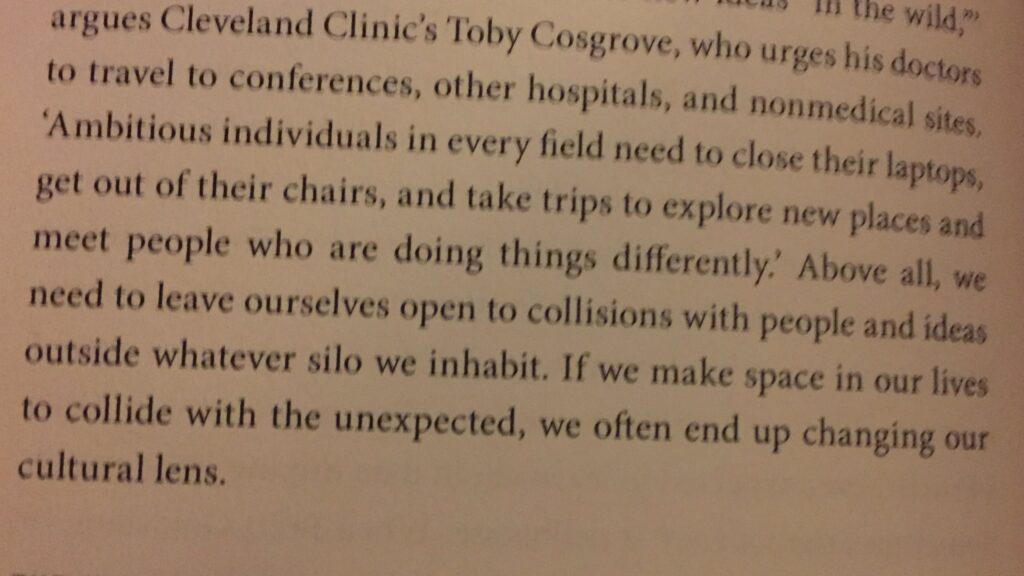
5) Build more – I’m super proud of what Campaign Bootcamp has become since I helped to found it back in 2012 – every few weeks I see a campaign agitating for change and winning from within the Bootcamp community. I believe its a vital part of the campaign infrastructure that we need to ensure we can train, equip and support campaigners to win.
I’ve no doubt that those on the ‘other’ side are reenergised and reinvesting in their infrastructure – so in 2017 I want to explore what I else I can contribute to building so that we’re better equipped to win. I’ve no idea what that is yet, get in touch if you’ve got a good idea.
6) Ask more questions – Campaigners always need to be asking questions (some suggestions here)- what does success look like, do we really need to campaign, who can deliver the change we want. We’ve got scare resources to allocate, and I know that those on the opposite side aren’t planning to take it easy in 2017 – read this for a slightly terrifying view on they think needs to be done in 2017. So I’m going to ask more questions, especially the ‘why’ question – ‘why will doing this help achieve the change we’re looking for’, ‘why do we think that’ – it’s a powerful question.
7) Rest more – with so much to do it’d be easy it’d be easy not to giver permission to rest, but as I’ve written before rest is vital if we’re going to be able to sustain this work for year. Rest doesn’t have to mean sitting around, but taking time to step out of our work to do things that recharge and reenergise us. I know for me that means running (I’m a big ParkRun fan) and tackling some new challenge (a Triathlon for me).
So that’s more of what I’m going to do in 2017 – do use the comments below to let me know what you’re thinking.
Disagree with the result – but you can learn from Trump and Vote Leave campaigns
2016 hasn’t been a great year (and at the end of it I’d encourage everyone to read this about how to make sure we’re looking after ourselves as campaigners) – but I’m convinced that there is learning for campaigners to take from any campaign – even if you passionately disagree with the outcome.
Let’s start with Trump
- Don’t underestimate what those on the ground are telling you – in a world of insight and data it’s easy to trust the model, but the unexpected victory of Donald Trump in November has led some to suggests that the Clinton ignored those on the ground who saw the threat coming – so much so they might have actually been mobilising people to vote for ‘The Donald’
- Everyone get’s excited about Twitter but Facebook is where it’s at – we might have all become obsessed with Trump’s tweets, but behind that Donald Trump was building a Facebook operation to target those who he needed to mobilise, but no one else could see those posts. It was the same in Australia, where the unseen Facebook campaign helped swing the election, or Brexit where the Leave campaign ‘served about one billion targeted digital adverts, mostly via Facebook’.
- Get creative about how you acquire the data you need – For Clinton it was via concerts to collect data to help mobilise key voter groups, for the Leave Campaign it was a competition to win £50m if you could predict the results of the European Football Championships. Both might be seen as gimmicks but they helped to collect data the campaigns needed.
- But if you are going to respond with protest have a clear theory of change – as this article there is both a science and an art behind successful protests. Want to get the low-down on what makes a protest work then these 10 social science insights are a good place to start
Don’t overlook what Bernie Sanders built
While he might have lost the Democrat Primary his organising model is likely to echo into future elections (this is a good summary and you should 100% read this).
- Make the most of armchair volunteers – Bernie didn’t just ask people to get involved in contacting voters, but his distributed organising model made the most of armchair volunteers – individuals who are happy to spend hours at home inputting data or staffing virtual help desks.
- Build a model that can scale – Sanders started as the underdog, he didn’t have lots of money or people so outside the first few states he had to build a distributed model that could scale. The principles can be adapted by other campaigning organisations as this Net Change report shows.
- Harness the power of mobile – If 2008 was the email election and 2012 was the Twitter election, I’m not sure what 2016 should be called, but the way that Bernie used mobile to engage with voters might be one of the lasting legacies.
Remember Brexit?
I wrote this shortly after the vote in June. I think lots of the insight still stands but 6 months later there are an abundance of people writing from inside the campaigns on what worked and didn’t work.
- Focus beyond the Westminster Bubble – I really enjoyed Unleashing Demons by former No 10 Communications chief Sir Craig Oliver. Although he was on the losing side this insight seems pertinent to all campaigners;

- Message discipline wins – Like it or not, but Vote Leave focused on a tight message about take back control, with the now dodgy £350m statistic at the heart of it. As Tom Waterhouse who worked on the Leave campaign writes they managed to get their message to stick in a way that the Remain campaign didn’t, and while the Remain campaign tried to focus on myth-busting, Jon Quinn suggests it’s an increasingly ineffective tool.
- Street stalls don’t win you elections – while they can be good for visibility, the Leave campaign focused on building an impressive operation to make sure they were targeting the right people rather than high profile but ultimately ineffective approaches. From gathering emails from those who fancied winning £50m from predicting the election, to building their own technology to gather all the data they were collecting, to targeted mailings. As a result of testing, Leave knew who it needed to mobilise on June 23rd.
If you want more on the Referendum here are good insights from the Leave and Remain sides.
There is hope in unusual places – I’ve already shared learning from the Australian election, but this story of how Get Up focused it’s resources to impact where it really mattered.
But finally, let’s not forget that US Elections lead to some of the best campaign videos – this is one of my favourites.
“You want to give me a good send-off? Go vote!” —@POTUS: https://t.co/tTgeqy51PU pic.twitter.com/ESQkLV2yaJ
— Hillary Clinton (@HillaryClinton) October 12, 2016
Books I've enjoyed this year – some recommendations for campaigners
It’s the time of year when people are looking for ideas for Christmas gifts. So here are a few recommendations from things I’ve read over the last 12 months for campaigners looking to add something else to under the tree.
How Change Happens – Duncan Green’s long trailed book answers a critical question that all campaigners need to grapple with – how does change happen. It’s a really good read, and as I wrote here I really enjoyed some of the challenges that Duncan puts out to those of us who work in campaigning. Change doesn’t happen in a linear way, and we need to adjust our thinking and approach to respond to this.
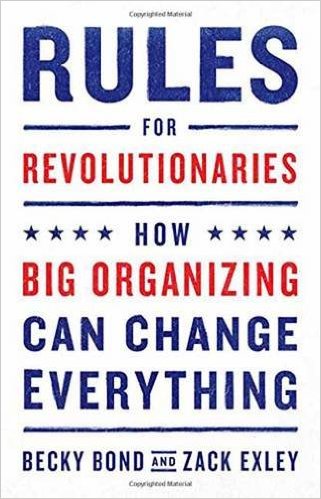 Rules for Revolutionaries: How Big Organizing Can Change Everything – I need to do a bulk purchase of this to pass onto my team. It’s simply a brilliant book written by Becky Bond and Zack Exley who were the brains behind the ‘distributed organising approach’ that took Bernie Sanders so far in the Democratic primary in the US .
Rules for Revolutionaries: How Big Organizing Can Change Everything – I need to do a bulk purchase of this to pass onto my team. It’s simply a brilliant book written by Becky Bond and Zack Exley who were the brains behind the ‘distributed organising approach’ that took Bernie Sanders so far in the Democratic primary in the US .
It’s short, at around 150 pages, unpacking how the approach was so successful with lots of stories to make the pages wizz by. Bernie Sanders clearly built something very unique so the 22 rules in this book. It’s oozing with wisdom and insight. A MUST READ.
Blueprint for Revolution – I loved this from Srdja Popvic, the Serbian activist who led the movement to overthrow Slobodan Milošević and has shared his skills around the world since. It’s part autobiography, but also part playbook for anyone involved in campaigning. It’s an easy and enjoyable read, with Popvic mixing a range of stories from his personal experience with lessons from history. My review of the book is here.
The Inevitable – this isn’t a book about campaigning, but the themes that Kevin Kelly explores in his book which looks at the themes which will shape technology over the next 30 years are totally relevant to anyone who wants to. I put the book down feeling a mixture of emotions, excited about what the future will look like for campaigning but also daunted about what the trends driving us towards. This is one of the best books I’ve come across to looking into the future. It’s not an easy read but a worthwhile read.
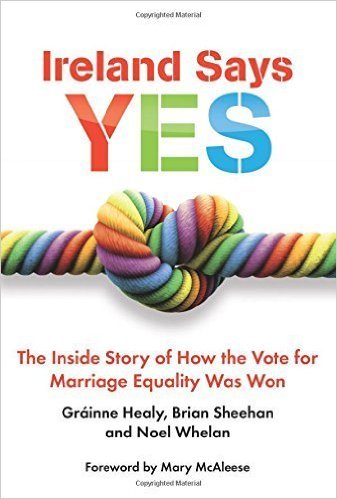 Ireland says Yes: The Inside Story of How the Vote for Marriage Equality Was Won – I had the privilege of hosting Gráinne Healy at the Bond Conference in March. Her insider account of the campaign for equal marriage in Ireland is brilliant.
Ireland says Yes: The Inside Story of How the Vote for Marriage Equality Was Won – I had the privilege of hosting Gráinne Healy at the Bond Conference in March. Her insider account of the campaign for equal marriage in Ireland is brilliant.
As I said to CharityComms – it’s a page-turning account of a referendum campaign which successfully integrated brilliant messaging, powerful messengers and creative tactics to win.
If the story of the Irish referendum inspires you, I’d also really recommend Winning Marriage: The Inside Story of How Same-Sex Couples Took on the Politicians and Pundit sand Won which focuses on the equal marriage campaign in the US.
Looking ahead, I’m also super excited about 2 books coming out in early 2017. The Myth Gap: What Happens When Evidence and Arguments Aren’t Enough by Alex Evans and Analytic Activism: Digital Listening and the New Political Strategy by David Karpf.
They’re definitely on my wish list for early 2017. What else should I be adding?
Leadership in campaigning – some thoughts
The further I’ve gone in my career the more I’ve been thinking about what leadership in campaigning looks like and the more I’ve found that there aren’t easy answers out there.
So it was great to be asked by Jim Coe to chat with him about some of my thoughts about leadership and campaigning a few months ago. You can listen to the whole podcast here, but preparing to speak with Jim and thinking about the topic has got me thinking.
There is of course a legal and project management element to campaign leadership – it’s important to know about the latest regulations from the Charity Commission, or how to manage a budget, or ensure good external stakeholder relations. But what I don’t find is writing about how to lead teams of campaigners or campaigns.
On leadership, I’ve been really inspired and informed by the writing of Margaret Wheatley, who wrote this excellent and very accessible paper (it’s only 6 pages long) on ‘host leadership’ a few years ago.
Most of us aren’t going to the be the ‘heroes’ who are the ‘face’ of a campaign or a cause – indeed I think there is a whole post to write about if the model of campaigns with a ‘figurehead’ leader is largely redundant.
But for those of us in leadership roles in campaigning it’s a really important paper to read, because it speaks to the challenge of managing and leading talented individuals who are hungry to change the world, working in complex (and often changing) situations where plans evolve and the external environment can shift at a moments notice.
So I’m really putting some thoughts out here, not to present them as a ‘blueprint’ but to spark a conversation amongst others in leadership roles in campaigning.
As a campaign leader I’ve found the following important;
1 – Help those around you make sense of the story – Helping others to step back from the now and understand how does a specific win or campaign fit into the bigger picture of the change that you’re going to achieve, how does that win further the cause that you’re all working for.
2 – Intentionally invest in others – This isn’t unique to leading campaigners, but there can be so much ‘doing’ in campaigning that it’s hard to find the time to pause and make sure people are investing in their personal development. What that looks like will be different for different people – some will appreciate being encouraged to find a mentor, others will need a recommendation of a good book to read, but holding the space for others to flourish by investing time in them means we continue to cultivate generations of campaigners.
3 – Model what you’d expect from others – Let’s be honest, burnout is a huge problem for campaigners. One of the hardest things that I find about leading a team is trying to model what the right balance looks like – I’m a workaholic. I know I don’t expect others to be ‘always on’ but often in campaigning its hard to switch off. It’s easy to tell others to do it, but as I’ve stepped into leadership I’ve become more and more aware that unless you ‘walk the walk’ you can’t expect to ‘talk the talk’.
4 – Understand my privilege – I was fortunate to spend a day thinking about power and privilege early in my career – it was insightful in helping me to think about this and challenge my approaches. I’ve still a lot to learn, but those of us in leadership need to be aware of our privilege. This from NEON is a really helpful resource to start to think about this.
5 – Recognise weaknesses – None of us are good at everything – so as much as we might not like to admit it – we need to be vulnerable to others including those we lead about what we’re not good at. I’ve found that people respect you for it.
6 – Assemble a team around you – Some of those I most admire in campaigning are individuals like Ralph Abernathy and Bayard Rustin they’re not household names, but they’re those who stood around Martin Luther King as he ‘led’ the civil rights movement. The one question I often encourage people to ask when they’re applying for another job is to ask their potential future line manager ‘who do they go to when they don’t have the answer’. Why? Because the best leaders I’ve ever worked with have had people around them to council and challenge them – leaders who think they know it all invariably fail.
7 – Create the space to be curious and ask ‘why’ – Like taking time out or investing in development, the space for evaluation is often lost in our busyness. Evaluation is more than just completing the indicators form at the end of a project. Campaign leaders need to be hosting those around them to ask some of the questions that Duncan Green was encouraging us to think about – to be curious about why change is happening or share rumours.
8 – Pass it on – I’ve written before about the importance of mentoring and coaching – which means those of us in leadership need to be generous in offering to do just that to those who are a step or two back in their campaign leadership journey. Not sure where to start Campaign Bootcamp has a mentoring scheme that’s always looking for people.
I’ve very much written this to start to kick off a conversation about leadership in campaigning, so please do comment below on what else I’ve missed.
